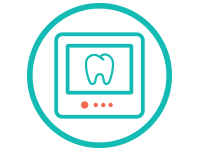Our services, explained.
Some patients lean on their doc to give them all the info, others like to do a little digging themselves. If you're the latter, take a look below and find out a little more about your next procedure, or just browse the extensive list of services we offer at Honest Teeth.
Bridges
Bridges are commonly used to replace one or more missing teeth. They span the space where the teeth are missing. Bridges are cemented to the natural teeth or implants surrounding the empty space. These teeth, called abutments, serve as anchors for the bridge. A replacement tooth, called a pontic, is attached to the crowns that cover the abutments.
As with crowns, you have a choice of materials for bridges. Your dentist can help you decide which to use, based on the location of the missing tooth (or teeth), its function, aesthetic considerations and cost. Porcelain or ceramic bridges will be matched to the color of your natural teeth.
Conscious Sedation
Patients who opt for sedation find they are much more comfortable and experience a sense of confidence because they feel they have found a place to feel safe and a whole team they can trust to provide for their needs.
Dental Oral Sedation provides many advantages including:
A more comfortable treatment experience
Reduced number of visits required for larger operations
Less anxiety for people who are apprehensive of dental c
Crowns
A crown is used to entirely cover or "cap" a damaged tooth. Besides strengthening a damaged tooth, a crown can be used to improve its appearance, shape or alignment. A crown can also be placed on top of an implant to provide a tooth-like shape and structure for function. Porcelain or ceramic crowns are matched to the color of your natural teeth.
Your dentist may recommend a crown to:
Replace a large filling when there isn't enough tooth remaining
Restore a fractured tooth or protect a weak tooth from fracturing
Attach a bridge
Cover a dental implant
Cover a discolored or poorly shaped tooth
Cover a tooth that has had root canal treatment
Dental Implants
Dental implants are essentially teeth that can look and feel just like your own. An artificial tooth root that is placed into your jaw to hold a replacement tooth or bridge. They're an ideal option for people in good general oral health who have lost a tooth or teeth due to periodontal disease, an injury, or some other reason.
What Dental Implants Can Do:
Replace one or more teeth without affecting bordering teeth
Support a bridge and eliminate the need for a removable partial denture
Provide support for a denture, making it more secure and comfortable
While high-tech in nature, dental implants are actually more tooth-saving than traditional bridgework, since implants do not rely on neighboring teeth for support. Dental implants are so natural-looking and feeling, you may forget you ever lost a tooth..
Dentures & Partials
Dentures and partials are removable prosthetics that replace a group of teeth. They are usually supported by the surrounding gum and underlying bone as well as by remaining teeth if any remain. Dentures and partials require a few weeks to adapt to, as well as periodic adjustments. This is because a person’s mouth evolves over time, whereas dentures have a static shape. Therefore it is common for dentures and partials to be replaced every two to three years.
Removable prosthetics:
Completely removable, resin-based dentures are used when there are no teeth left at all.
Partial removables are metal-based prosthetics that are supported by gums and the remaining teeth with the use of hooks.
Removable prosthesis on implants provide stability when there are no teeth left on either jaw set. First, implants are surgically installed, then a removable prosthetic is snapped or slid over the implants, or is attached magnetically.
Digital Radiography
Welcome to fast results, simplified processing, and a host of benefits are available thanks to digital radiography. This ever evolving tool helps improve our understanding of acquired oral images. We can select, measure, filter, enhance and reconstruct the information of greatest diagnostic value in ways that were not possible with traditional film.
Information accessibility - digital information reduces storage space, and makes it easy to track our clients’ information with a minimum effort, so discussing problems and solutions has never been easier. Patients can see exactly what is going on.
Environmentally friendly - no chemicals are used or disposed of. Sensors can be reused for thousands of exposures without any environmental impact whatsoever.
Intraoral Photography
Intraoral photography is an innovation that provides a close-up view of the inside of a patient’s mouth. For restorative and cosmetic dentistry, there is no better way to communicate to the laboratory the desired results than with digital photography.
The actual sensor used to capture an image is approximately the size and shape of a dental mirror. It has a built-in light source, so it gives us easy-to-see video and still pictures. The technology allows a dentist to zoom in on one tooth or capture a video of an entire mouth. Resulting images can be displayed on a computer monitor, so problems like worn or broken fillings, plaque deposits, cracked teeth, cavities, or gum deterioration, can be clearly identified.
Images from a digital intraoral examination can also be e-mailed or printed out for you to take home or for storage with your dental record. They can also by sent to specialists and insurance companies.
Invisalign
Invisalign orthodontics is clear braces, or aligners which are custom made to your mouth and designed to move teeth. Each aligner in a series is designed to move teeth a little bit and is generally worn for about two weeks.
This treatment involves moving teeth with no wires, brackets or rubber bands. Invisalign offers a discreet, easy to wear and easy to clean solution for those looking for a straight and healthy smile without anybody knowing!
Laser Treatment
Laser dentistry can be a precise and effective way to perform many dental procedures without damaging surrounding tissues. If you are anxious and are seeking greater safety and comfort, you might consider laser dentistry treatments.
Procedures performed using soft tissue dental lasers may not require stitches
Certain laser dentistry procedures do not require anesthesia
Laser dentistry minimizes bleeding because the high-energy light beam aids in the clotting
Bacterial infections are minimized because the laser beam sterilizes the area that is being worked on
Damage to surrounding tissue is minimal
Wounds heal faster
Root Canal Therapy
Root canal therapy is used to fix damaged dental pulp. Pulp is the soft tissue inside the tooth that contains nerves, blood vessels, and connective tissue. Not all infected teeth can be successfully treated, but in 95 percent of cases a natural tooth can be saved with an appropriate endodontic procedure. Root canal therapy is necessary because without treatment, the infection of the dental pulp will spread to the bone around the tooth, making it unable to hold a tooth in place.
Common causes of pulp and nerve damage are:
Physical irritation brought on by serious tooth decay or damaged deep fillings allow harmful bacteria to reach the nerve area and cause infection and decay.
Shock or a blow to a tooth or the jaw can cause damage to sensitive nerve tissue within the tooth.
Symptoms of pulp-nerve damage may include:
Excessive sensitivity to hot and cold drinks
Pain when biting down on the tooth or chewing
Facial swelling
Teeth Whitening
Today, there are hundreds of products that all claim to give you whiter teeth in a very short time. But results can range from impressive to disappointing, or even non-existent (if you’ve selected a fraudulent product.)
With so many different kinds of systems and products to choose from, people have a difficult time selecting the right one, especially when about a third of them misrepresent their effectiveness. That’s why it is important to get the right information before opting for any kind of teeth whitening.
Veneers
Dental veneers are a form of cosmetic dentistry used to create a bright smile with beautifully aligned, shapely, white teeth; and the translucent, ceramic look of today's veneers gives an entirely natural appearance that makes it hard to distinguish from the surface of natural teeth. No matter what causes unattractive teeth, be it wear, unevenness, genetic conditions or aging, dental veneers can solve most cosmetic dental issues.
Composite resin and porcelain veneers are the two most common materials used in the manufacture of dental veneers. Both can be fabricated in a dental laboratory. Composite veneers can also be directly fabricated inside your mouth during a visit to our offices.
Pediatric Dentistry
If you’re a new parent of an infant, you might be wondering when you should start bringing your child to the dentist. The American Dental Association recommends that your child see the dentist when they turn one year old, or when their first tooth erupts; whichever happens first. As your child gets older, sealants, six-month dental exams, and teeth cleanings are the best way to keep your child’s mouth healthy for years to come.
Despite your best efforts, your child can still develop a cavity that may require a filling. Almost 50% of children in the US will develop at least one cavity by the time they’re 19 years old. We know that a filling can seem intimidating to you and your child. We do our best to explain the process in a child-friendly way and make sure that you and your little one are comfortable throughout the procedure. We also offer sedation dentistry for kids of every age, and we use tooth-colored composite fillings, so your child’s smile will remain bright, white, and beautiful.
Cosmetic Dentistry
If your teeth are crooked, stained, gapped, or discolored, this can make you self-conscious about your smile. At Honest Teeth, we believe that every patient deserves a proud grin, and that’s why we offer a wide range of cosmetic services such as whitening, veneers, Invisalign clear aligners, and more to improve smiles! Dr. Meinerz and Dr. Krueger have years of experience helping patients spruce up their smiles, so reach out today if you want to start your journey to the smile of your dreams! We welcome our patients to come in for a free consultation for cosmetic dentistry where we’ll discuss the range of options available in our office.














